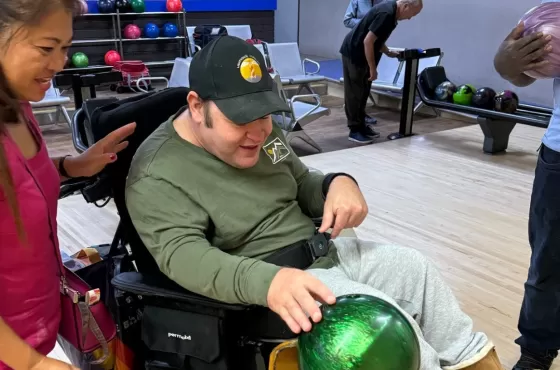NDIS support workers are the backbone of disability support in Australia. Their work empowers clients to live fulfilling and independent lives. It’s also an incredibly rewarding and fulfilling job!
Essential skills and knowledge for NDIS support workers
First, let’s talk about the more tangible things employers look for.
The basics
Qualifications like a Certificate III in Individual Support can open doors, but NDIS service providers also value transferable skills. On your application, give us examples of your resourcefulness and willingness to help others. Examples can be from roles that weren’t direct support.
NDIS understanding
Applicants who are familiar with NDIS principles, rights of participants, and support frameworks have an advantage. But even without direct experience, there’s nothing stopping you from researching. In fact, trying to learn more shows initiative and commitment to the field!
Specific expertise
Some providers (like Lighthouse Disability) provide specialised support, such as medication administration and complex behavioral intervention. These providers actively seek workers with demonstrated competence in those areas. Be sure to tailor your application to their approach.
Join us and deliver support people can depend on Looking for work now?
The heart of a great NDIS support worker
Skills, experience, and training are only part of what we look for in disability support workers. Equally important are qualities that make you suited for the role.
Compassion and empathy
Disability support goes beyond performing tasks. Support workers need to connect with participants on a human level and genuinely care about their journey. In your application, give examples of when you showed these qualities. Volunteer experience counts, too!
Person-centred approach
Tailoring support around a client’s needs, goals, and preferences is the guiding principle of quality NDIS work. Share examples of when you've tailored your approach - again, your examples can be from other roles. Show you can think at a person-centred level and that you understand this important element of the NDIS.
Respect and empowerment
Good support workers uphold the rights of people with disability and empower clients to exercise choice and control. Give us examples of times when you called out unethical behaviour towards another person, improved a practice that wasn’t optimised for dignity, or advocated for someone else.
Extra things to make NDIS support workers stand out
There are many other attributes that good candidates have. A lot of them are intangible things that you can easily demonstrate through effective examples in your application.
Positive attitude and flexibility
A common theme in disability support work? Unpredictable situations. The work itself can be emotionally taxing, and sometimes support workers are exposed to vicarious trauma. For these reasons, an upbeat attitude, open mind, and the ability to adapt are highly valued.
Communication skills
Support workers must be able to understand both verbal and unspoken needs. They must actively listen to understand, rather than listening to reply. The ability to articulate things clearly and respectfully is vital. Strong communication skills like these help support workers build rapport and trust with clients and their support networks (such as families).
Advocacy mindset
Strong NDIS support workers naturally become advocates for their participants. By representing their best interests and teaching self-advocacy skills, the support worker builds a working relationship full of empowerment, respect, and trust.
Tips to impress in your application
Employers typically get a lot of job applications, so it’s important to stand out! Here are our top tips for putting together a stellar application.
Showcase your values
Don’t just talk about duties – tell us about situations (even beyond healthcare settings) where your values shined. When did you demonstrate compassion, initiative, or problem-solving abilities? We mentioned above that these are valued in disability, so be sure to clearly highlight who you are at your core.
Get experience
Work experience isn’t the only way to get a role in disability. Volunteer work with similar organisations or informal support worker roles bolsters your application and shows eagerness to learn. Plus, you’re bound to pick up useful knowledge and skills from these experiences that you can bring to a new role.
NDIS Support Worker networks
Engage with online communities and support groups to connect with peers. It demonstrates passion, a desire to learn, and helps you identify professional development opportunities that you might otherwise miss.
To summarise...
The ideal NDIS support worker boasts a mix of qualifications, practical skills, and personal ethics. Disability service providers look for candidates who can do the job well, and also those who connect with others and have the drive to transform lives.
Lighthouse Disability is always looking for passionate and skilled support workers. You can learn more about your new role, our recruitment process, why you should work with us or if you're ready for the next step you can apply now.
